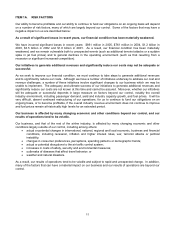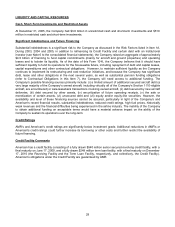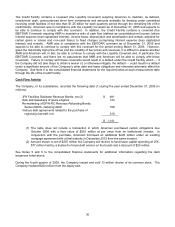American Airlines 2005 Annual Report Download - page 23
Download and view the complete annual report
Please find page 23 of the 2005 American Airlines annual report below. You can navigate through the pages in the report by either clicking on the pages listed below, or by using the keyword search tool below to find specific information within the annual report.
20
ITEM 3. LEGAL PROCEEDINGS
On July 26, 1999, a class action lawsuit was filed, and in November 1999 an amended complaint was filed,
against AMR, American, AMR Eagle, Airlines Reporting Corporation, and the Sabre Group Holdings, Inc. in the
United States District Court for the Central District of California, Western Division (Westways World Travel, Inc. v.
AMR Corp., et al.). The lawsuit alleges that requiring travel agencies to pay debit memos to American for
violations of American’s fare rules (by customers of the agencies): (1) breaches the Agent Reporting Agreement
between American and AMR Eagle and the plaintiffs; (2) constitutes unjust enrichment; and (3) violates the
Racketeer Influenced and Corrupt Organizations Act of 1970 (RICO). On July 9, 2003, the court certified a class
that included all travel agencies who have been or will be required to pay money to American for debit memos for
fare rules violations from July 26, 1995 to the present. The plaintiffs sought to enjoin American from enforcing the
pricing rules in question and to recover the amounts paid for debit memos, plus treble damages, attorneys’ fees
and costs. On February 24, 2005, the court decertified the class. The claims against Airlines Reporting
Corporation have been dismissed, and in September 2005, the Court granted Summary Judgment in favor of the
Company and all other defendants. Plaintiffs have filed an appeal to the United States Court of Appeals for the
Ninth Circuit. Although the Company believes that the litigation is without merit, a final adverse court decision
could impose restrictions on the Company’s relationships with travel agencies, which could have a material
adverse impact on the Company.
Between April 3, 2003 and June 5, 2003, three lawsuits were filed by travel agents some of whom opted out of a
prior class action (now dismissed) to pursue their claims individually against American, other airline defendants,
and in one case against certain airline defendants and Orbitz LLC. (Tam Travel et. al., v. Delta Air Lines et. al., in
the United States District Court for the Northern District of California – San Francisco (51 individual agencies),
Paula Fausky d/b/a Timeless Travel v. American Airlines, et. al, in the United States District Court for the Northern
District of Ohio Eastern Division (29 agencies) and Swope Travel et al. v. Orbitz et. al. in the United States District
Court for the Eastern District of Texas, Beaumont Division (6 agencies)). Collectively, these lawsuits seek
damages and injunctive relief alleging that the certain airline defendants and Orbitz LLC: (i) conspired to prevent
travel agents from acting as effective competitors in the distribution of airline tickets to passengers in violation of
Section 1 of the Sherman Act; (ii) conspired to monopolize the distribution of common carrier air travel between
airports in the United States in violation of Section 2 of the Sherman Act; and that (iii) between 1995 and the
present, the airline defendants conspired to reduce commissions paid to U.S.-based travel agents in violation of
Section 1 of the Sherman Act. These cases have been consolidated in the United States District Court for the
Northern District of Ohio, Eastern Division. American is vigorously defending these lawsuits. A final adverse court
decision awarding substantial money damages or placing restrictions on the Company’s distribution practices
would have a material adverse impact on the Company.
On August 19, 2002, a class action lawsuit seeking monetary damages was filed, and on May 7, 2003, an
amended complaint was filed in the United States District Court for the Southern District of New York (Power
Travel International, Inc. v. American Airlines, Inc., et al.) against American, Continental Airlines, Delta Air Lines,
United Airlines, and Northwest Airlines, alleging that American and the other defendants breached their contracts
with the agency and were unjustly enriched when these carriers at various times reduced their base commissions
to zero. The as yet uncertified class includes all travel agencies accredited by the Airlines Reporting Corporation
“whose base commissions on airline tickets were unilaterally reduced to zero by” the defendants. The claims
against Delta Air Lines have been dismissed, and the case is stayed as to United Airlines and Northwest Airlines
since they filed for bankruptcy. American is vigorously defending the lawsuit. Although the Company believes
that the litigation is without merit, a final adverse court decision awarding substantial money damages or forcing
the Company to pay agency commissions would have an adverse impact on the Company.
























